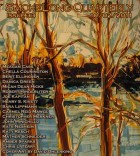I imagine every Southern child has heard light-hearted warnings about the consequences of swallowing watermelon seeds. What struck me about this is how you used these as a springboard into this fabulist world. Is this characteristic of your writing?
I had no idea this story was so common, but it makes me happy that it is. When I was a kid, my grandfather used to warn me about swallowing the seeds. The warning took something perfectly ordinary and made it full of possibility and magic. That’s exactly what I aim for in my work. I do think of myself as a fabulist. I’d say that most of my work is not inspired by things like family stories or existing tales, but I have written several stories that, like this one, are retellings. My father and grandfather were always great storytellers. There’s something that feels really right about taking those stories and riffing on them, doing my own thing with what they’ve given me. Those are often the stories of mine that I like best.
The image of the fetus inside the watermelon is such a surprise. (I think I actually gasped, reading it the first time.) Can you say what inspired the idea?
Thank you! I’m pleased with that image. It happened very organically as I was writing the story. I put off writing this one for a long time because I wasn’t sure where it was going to wind up. Finally, I just started it, and the story created its own fabulist logic: watermelon vines swallow up the boy, so he gets planted in the dirt; he gets planted, so more watermelons grow out of him; he’s still inside the vines somewhere, like a seed, so he comes out again inside the fruit. It was one of those amazing moments where the story took me completely by surprise as I was writing it.
There is violence between the grandfather and Dino: Dino biting the grandfather’s arm, the grandfather planting Dino in the ground, and pissing on the mound. And yet, there seems to be something much deeper, almost archetypal, about their relationship. Was this your intention?
As far as the violence goes, I love characters who can be casually cruel to each other, especially to their loved ones. These are always my favorite people to read about.
I don’t think I intended it, no, but that sort of relationship is common in my work. I like writing about father/son relationships. Sometimes it’s a grandfather or an uncle rather than a father, but I think it plays out the same. There is something about that relationship that’s really competitive, right? A father-figure often seems mythical and powerful, good at everything. The boy wants to be as good, or better yet, wants to beat the father at something. No matter what it is: opening the pickle jar, catching the first fish, getting the highest score in a game. Competition is a big part of that relationship. I’d say it’s inherently archetypal, going back to the story of Cronus and Zeus.
It’s funny you’d ask this, because I’m currently writing a novella about a father who is at war with his children. It’s going to be Southern, rural, and very magical. He’ll be sort of a Cronus figure, but a god in squalor.
What are you working on now?
I’m trying to do more book-length work, and hopefully get a book published in the next few years. To that end, I put together a manuscript of short stories early this spring. It’s a collection of modern fables, fairy tales, and magic realism. The working title is Electricity and Other Dreams, and it’s out to a lot of different book contests, agents, and publishers right now. Writing queries and cover letters and interacting with agents is all very new for me. And I know that seeking book publication is a long ordeal with no guarantees, so I’m working hard at it and trying to learn as much about the process as I can. It’s something I have to spend time on every week.
After sending the collection out, I wrote a novel in early summer called Ball Season. It still needs some work, but it’s a story I’ve been wanting to tell for a long time. I’ve always loved the tale of the young girl who gets lost in a magical place and has to find her way home: Alice in Wonderland, The Wizard of Oz, that Labyrinth movie with David Bowie, dozens of others. My favorite work in this genre is Miyazaki’s animated film Spirited Away. So I wrote my take on this old story, and I tried to mess with some of the conventions. For example, often in these stories, the girl comes out completely unscathed. She returns to her family and no matter how long she was gone, no time has passed in her world. I’ve always hated that. It makes the story feel inconsequential, like it never happened. In mine, she will have to deal with the fact that her world moved on while she was away.
I’m letting the novel cool for a few months, and right now I’m just beginning work on the novella I mentioned about the rural family in a magical version of the American South. A really ugly draft of that should be done this winter.
After classes let out in December, I plan to revise Ball Season and send it out, and at least do a quick revision of the novella. Once all that’s done, I guess this will have been a pretty productive year for me.
I’m really curious about your PhD program. There aren’t that many creative writing PhD programs, are there, compared to MFA programs?
As I understand it, no, there are not as many PhD programs in creative writing as there are MFAs. For a while, the MFA in creative writing was considered terminal, but I think that’s changing as English department search committees want applicants with a PhD, no matter their specialization. Roughly a third of my coursework will be workshops and creative writing classes, while the other two thirds will be in literature. My dissertation will be a book-length work of fiction.
I’m just beginning the program at Florida State University this semester. So far, it’s wonderful. The faculty and the other students are great. There are some really strong writers here. Mostly, I’m just excited and grateful to be in such a good program.



 The SmokeLong Grand Micro Contest (The Mikey) is now an annual competition celebrating and compensating the best micro fiction and nonfiction online.
The SmokeLong Grand Micro Contest (The Mikey) is now an annual competition celebrating and compensating the best micro fiction and nonfiction online.